Last night a large group crowded into the Plaza Conference Room at the World Trade Center downtown to help give input on how PDOT should deal with a large gap in their budget.
The attendees were certainly engaged, but perhaps a little biased. It appears that certain stakeholder groups responded very strongly to Commissioner Adams’ invitation to ‘pack the room’ made at the Advisory Committee meeting.
Last night a large group crowded into the Plaza Conference Room at the World Trade Center downtown to help give input on how PDOT should deal with a large gap in their budget.
The attendees were certainly engaged, but perhaps a little biased. It appears that certain stakeholder groups responded very strongly to Commissioner Adams’ invitation to ‘pack the room’ made at the Advisory Committee meeting.
When polled about how they arrived at the meeting, 20% walked, 20% biked, 20% took transit and 30% drove alone. When asked about preferred modes, 39% responded ‘cycling’ :-)
OK, so we know which constituency is the most organized…
But the responses are still interesting. Some reflected a bimodal or bell-shaped distribution, indicating that perhaps different groups had different values, but some were strikingly unified and I think this exercise will yield valuable input for the Commissioner and the Advisory Committee.
Full results are promised on the Commissioner’s blog later this week.
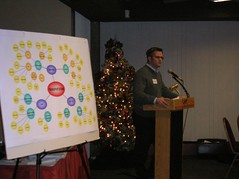
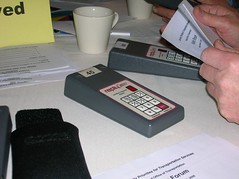
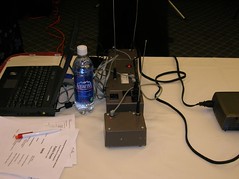
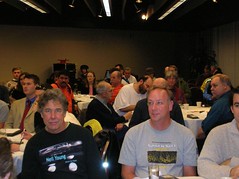
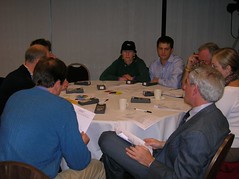
9 responses to “Report from the Budget Forum: Too Much Advocacy?”
Chris, you write: “The attendees were certainly engaged, but perhaps a little biased”
Each person attending was representing their own views, or bias. So yes, they were biased. But that doesn’t make it any less valid.
If the people who care so much about our transportation decisions to give up a couple of hours on a Tuesday want more bicycling, then perhaps we need to invest more in bicycling.
The exercise was publicized well, including in the Oregonian, and the nice thing that such a meeting has over most polls or focus groups is that requiring people to trade something (time) to give their opinion helps measure passion, and we can make decisions focused on meeting the needs of people who care the most, instead of those who don’t give a rip either way.
That said, if we polled Portlanders, and imagined everyone cared the same amount (an incorrect assumption) we would probably see somewhat, but perhaps not dramatically, different results. Past polls from Metro have found that people want to spend many more of our resources on bicycling and pedestrians than we do.
And I might note that several people who might normally have attended the meeting had other meetings at the same time — notably, the BTA Legislative Committee meeting was packed, meaning we missed the meeting.
And yes, I certainly hope we’re the best organized. ;)
Evan – probably I should have said ‘not representative’ rather than ‘biased’.
And I fully understand that beyond BTA’s effective organizing, the degree of concern over transportation issues is partially responsible for how deeply different constituencies were represented in the room.
The survey is now available on Sam’s blog as well.
I am not sure “not representative” is accurate either, at least if the implication is less representative than any other public meeting. The fact is that the people who care about these issues are largely people who bike.
The people who really care about streetcar already have it. The handful of developers that want to see it extended don’t show up at these meetings and wouldn’t outnumber even the BTA legislative committee if they did.
So while there may be some frustration for advocates of other modes, it is the biking community that has a clear idea of how local transportation investments will improve their lives. Almost everyone else either isn’t clear or doesn’t care, which is largely the same thing.
And I suspect Evan is correct. If you asked the typical Portland citizen they would want more money invested in bike, pedestrian and transit facilities. You can get where you need to go by car and that is really all that matters.
As Jessica posted, the survey we took at the meeting last night is now available for everyone to take online. I’m not sure why we needed to attend last night’s meeting. Sam said he wanted us to do outreach to our friends, families, and neighbors, but I’m not sure the need for outreach warranted that meeting.
Why didn’t they just put the operational and financial information online, provide the survey online, and then publicize its availability and the desire for input? It would have given people more time to think about the information before taking the survey, saved the City the cost of last night’s meeting, and saved us the time and effort of attending another meeting.
Ross, I’m not arguing with anything you say. I think we’re making different assumptions about the purpose of the forum. I think Sam and the advisory committee (of which Evan and I are members) are looking for something more like polling to help determine what cuts the least politically painful (more PC: in alignment with the community’s values). While having great turnout from the bike community ensures that cycling programs won’t get cut (I don’t think they were really at risk), it creates noise in the data that makes it hard for us to figure out what could be cut. That’s the point I was trying to make about overrepresentation.
I think Sam erred in the first instance in charging us to ‘pack the room’. Since the freight folks heard the same charge, I don’t think those of us preferring non-auto modes had much choice except to put out the call to action.
Cate, to your point, I think a live event creates dialog that can’t happen in an online survey by itself. I don’t fault Sam on that at all.
Chris –
This is a little off-topic, but I am going to put on my citizen-participation hat for a minute.
No aggregate data at a public forum represents anything beyond the people who attend. The attendees are always unrepresentative of the broader public. If you want information about public opinion then you need to do polls and focus groups that are designed to do that.
What you got from the forum is the views of a subset of people who cared enough to show up. That has value since those people have probably put more thought and care into their opinions than many people in the public. But, frankly, I doubt that value is worth the time and energy it takes for those people to show up and provide it.
The more helpful citizen participation is one that allows citizens the opportunity to provide their qualitative advice based on their knowledge and experience. In that kind of process the aggregate data is for the benefit of the people in the room – it helps them understand where they agree and disagree with the larger group. That can be helpful for forcing people to reevaluate the opinions they walked into the room with. And that is valuable if you have a way to capture the narrative of the discussions they have with other citizens as a result. In that context you capture not only the advice, but the extent to which others find there to be wisdom in it that should be considered in the decision.
An awful lot of citizen participation in Portland is window-dressing. Certainly most of the public hearings that are held by elected bodies have no impact on the decision since they are held at the end of the process when most of the compromises have already been made. They serve a purpose in airing the remaining disagreements before the vote, but they don’t provide the opportunity for participation.
Forums that let people “vote” and don’t capture the individual and collective wisdom of the people who attend are also window dressing. If the people agree with you, the aggregate data can be used to support your position. If they don’t it can be ignored as unrepresentative. But it usually has no value at all in informing the decision precisely because the opinions of the people in the room have no special meaning in the process. There are exceptions, but usually to the extent the aggregate data does inform the decision, it is misinforming it.
Here is another report I wrote on the forum.
One interesting thing I’ve noticed about these meetings is how few people actually show up at them. How many came to this one? A hundred? A thousand? Meguesses somewhere between the two, tilted toward the former.
The population of Portland is around 550,000. If we assume 200 people showed up (clear guesswork here), then that is .036% of Portland’s population.
As far as democracy is concerned, that is worse than pathetic. We might as well have a dictator if things are this tilted towards special-interest groups.
On the othe rhand, I don’t care since it seems things are going just fine. =)